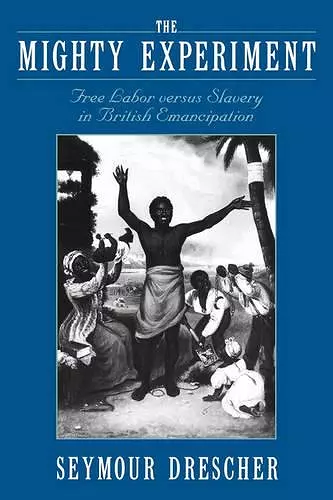The Mighty Experiment
Free Labor versus Slavery in British Emancipation
Format:Paperback
Publisher:Oxford University Press Inc
Published:23rd Sep '04
Currently unavailable, and unfortunately no date known when it will be back

This study examines the connection between economic growth and moral considerations surrounding slavery, highlighting Britain's pivotal role in emancipation and the influence of early social sciences on the debate.
The Mighty Experiment by Seymour Drescher delves into the complex relationship between economic growth and moral considerations surrounding slavery, particularly within the context of British history. The narrative begins in the mid-eighteenth century when the transatlantic slave trade was viewed as essential for the capitalist economies of Europe and the Americas. Britain, as a dominant power in this system, appeared poised for limitless expansion. However, in 1833, the British Empire took a groundbreaking step by becoming the first to abolish slavery, subsequently influencing global movements toward emancipation. The motivations behind this pivotal decision have sparked extensive debate, with interpretations ranging from a strategic withdrawal from a failing system to a significant investment in colonial reform.
Drescher argues that the abolition of slavery was not merely a reaction to economic decline but rather a critical humanitarian achievement. He explores how various stakeholders, including politicians, bureaucrats, and scholars, employed rational scientific arguments to support anti-slavery positions, moving beyond mere moral rhetoric. This integration of social sciences into the political discourse aimed to reduce tensions and foster common ground among differing viewpoints.
The book also highlights the contributions of early social scientists like Adam Smith and Thomas Malthus, who provided the intellectual tools to address issues of demography, racism, and political economy. By the time emancipation was legislated, it was perceived as a significant social experiment with the potential to enact profound change. Overall, The Mighty Experiment offers valuable insights for scholars interested in British history, imperialism, slavery, and human rights.
Awarded the 2003 Frederick Douglass Book Prize
Drawing on an astonishing range of primary and secondary sources, Drescher has produced what must surely be the definitive account of the competing claims of free and slave labour in the 'age of abolition'. * English Historical Review *
Drescher reconstructs this complex narrative with great skill and ingenuity. He also makes a vital and hitherto unexplored connection between the 'failure' of emancipation and growing racialization at home. * English Historical Review *
The Mighty Experiment is hugely impressive, both in terms of its breadth and its historical vision. * English Historical Review *
Drescher breaks new ground in The Mighty Experiment by looking at abolition in terms of the debates between the political scientists of the period. To the extent that he focuses on the economic consequences of abolition, he opens our eyes to aspects of the story absent from the customary self-congratulatory accounts ... outstanding. * Howard Temperley, Times Literary Supplement *
- Winner of First Prize, 2003 Frederick Douglass Book Prize, Gilder Lehrman Center for the Study of Slavery, Resistance, and Abolition.
ISBN: 9780195176292
Dimensions: 235mm x 161mm x 22mm
Weight: 472g
318 pages